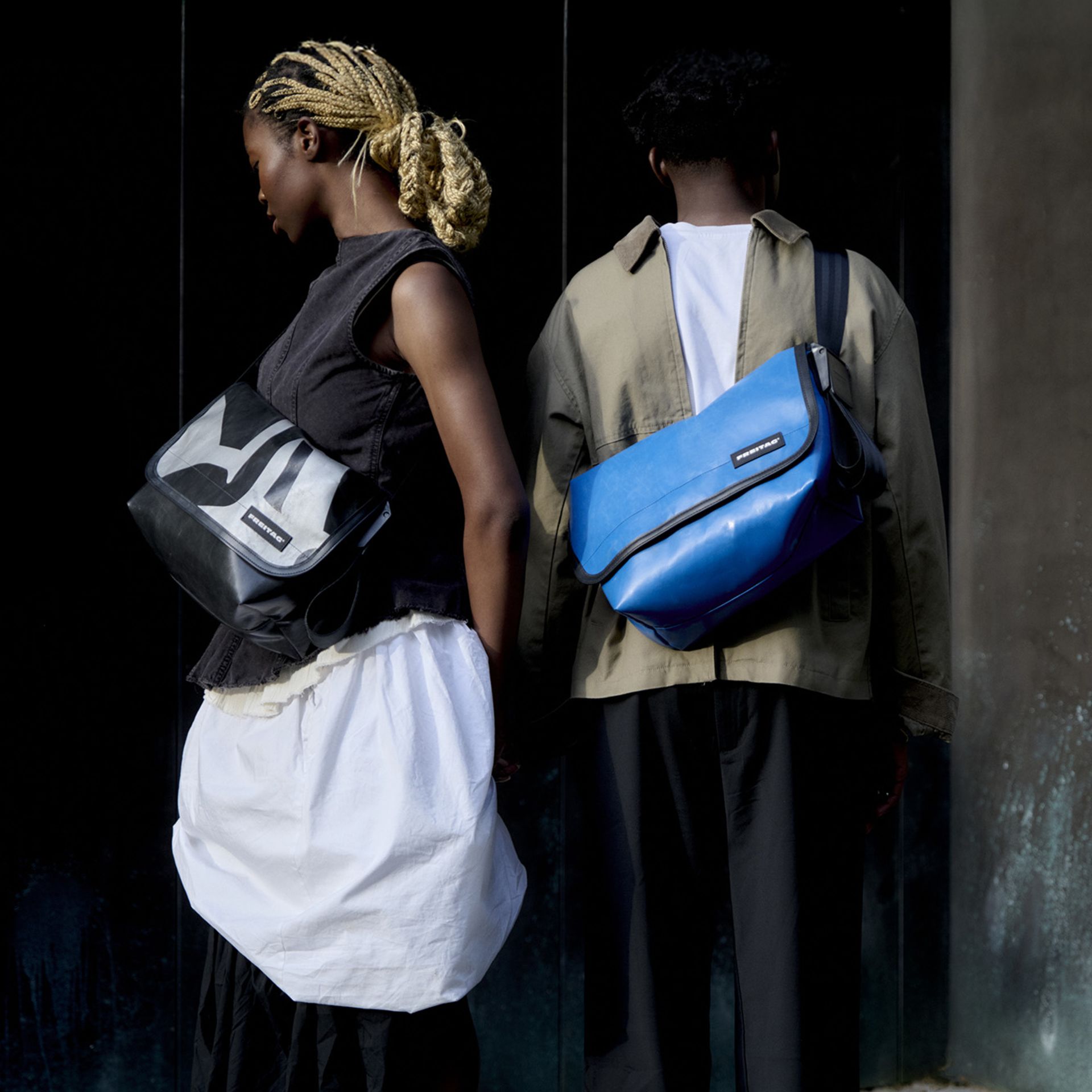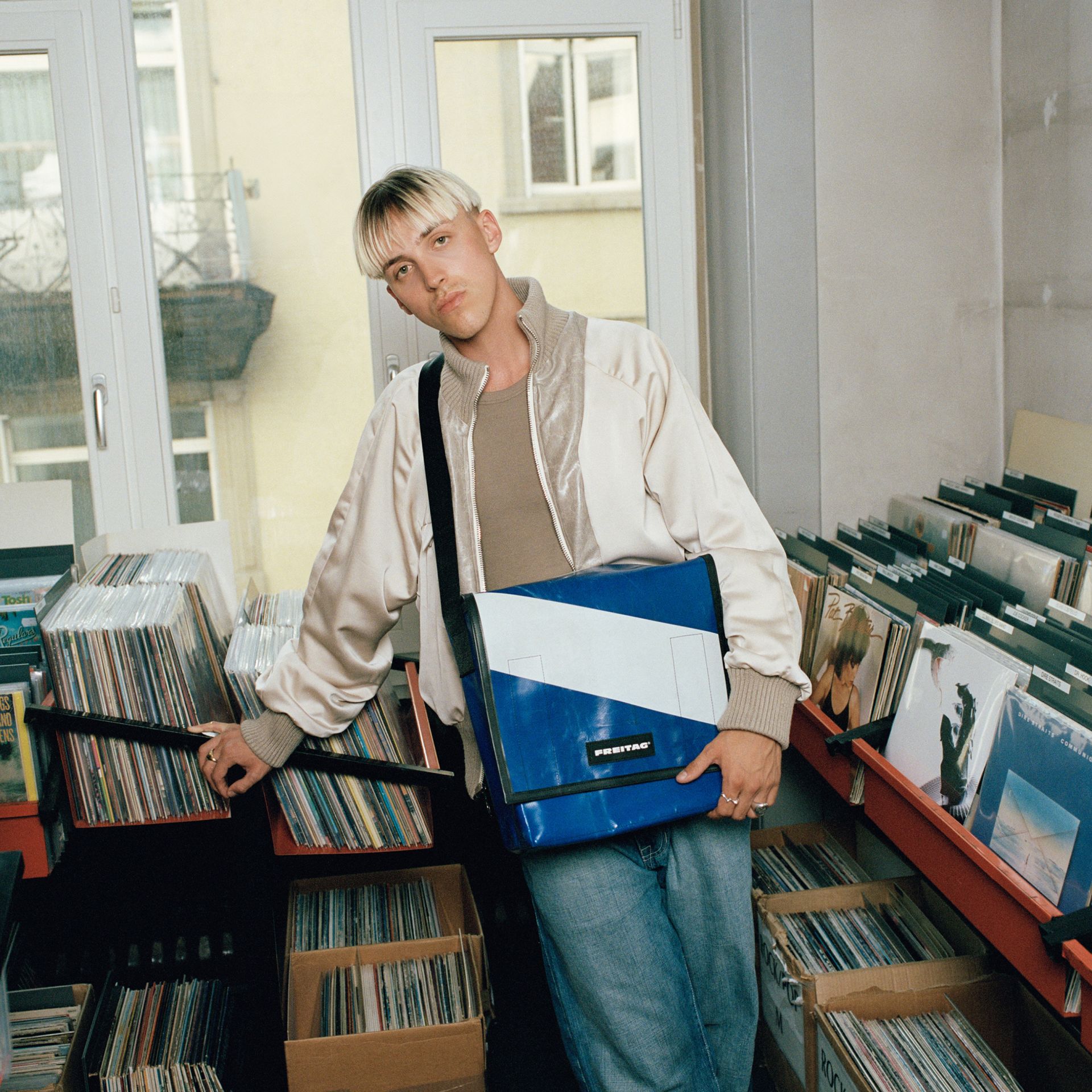
Together with partners in industry, we’re developing a circular truck tarp that ends up back in the cycle after its second life as a FREITAG bag.
For more than 25 years, FREITAG has sustained a clearly defined corporate philosophy: namely, «We think and act in cycles». Today, we’re thinking mainly about how we can act even better in closed cycles. How much better it would be if our bags were not only recycled but also endlessly recyclable. In other words, if we could give discarded truck tarps not only a second life but an everlasting one. To this end, we are researching and working with various combinations of materials. And something that was only a big idea a short time ago has already been mounted on a small truck. So now, the first two prototypes of a circular tarp are out on the road doing their first test run.
THE TARP OF THE FUTURE
What will it take to ensure that the truck tarps we use to make most of our iconic bags and accessories will one day be circular and no longer end up as waste?
The answer to this question is simple but challenging: FREITAG will develop a circular truck tarp. It will do that with various industrial partners in the materials, chemicals, and composite sectors, as well as manufacturers, logistics companies, and institutions in the materials-testing and recycling industries. They all share the same vision and see the potential of the circular economy, which is why we work collectively without being financially dependent.

WHAT HAS HAPPENED SO FAR?
FREITAG began its search for the tarp of the future in fall of 2020. Instead of ending up in the garbage, the new tarp – or, more correctly, the FREITAG one-offs made from it – would one day return to the biological or technical cycle. This means that it must be biodegradable or can be broken down into its chemical constituents, which can then be recycled to make new tarps or other products. And, of course, the material must be robust, durable, water-repellent, and practical.
To implement it, we brought various players with the necessary expertise on board. The resulting heterogeneous and highly motivated community has taken flexible, parallel approaches toward achieving the clearly defined goal of a tarp revolution. In 2022, the first prototypes were mounted on a delivery van and sent out on a two-year test drive. In 2024, these pioneer tarps completed their maiden voyage, returned to FREITAG, and now provide valuable insights into the material's properties and recyclability.
FIRST TRUCK TEST FLEET ON THE ROAD
Meanwhile, the search for the perfect material continued in the background, and the work is bearing fruit: two sub-projects are now ready for the endurance test. Since fall 2024, our first circular tarps have been rolling down the highway in a pack: In Planzer, a Swiss logistics company, we found a partner in the road freight industry that fitted out six trucks and five trailers with two different test tarps. The tarps were supplied by Bieri Tenta AG, who also printed them and spent many hours on extensive material tests to ensure that they could be processed and carry signage. The trucks will be out on the road for varying lengths of time, so we can see more clearly how the material ages out in the wild.
FROM HIGHWAY TO BAG FACTORY
The first circular tarps have been back from their long road trip since summer 2025. Since then, the second test phase has been underway at FREITAG in Zurich-Oerlikon. The question: are the tarps suitable for being made into bags? We’re checking to see how the material behaves in our production process — from the dismantling tables to the giant washing machines to the cutting section. The first bag prototypes are taking shape in our in-house prototyping studio and with selected partner workshops.
The 40 or so bags are now being tested by real people in real life: How tough, flexible and water-repellent are they? How does the material hold up under heavy use? This test phase will run for several months, and we hope it'll show whether one of the two material combinations is better suited for a second life as an upcycled FREITAG bag.
RECYCLING AS THE FINAL STEP
The very last step towards full circularity is recycling. After all, following their second life as FREITAG bags, the plan is to turn the innovative tarps into truck covers again. And then back again. And again.
Progress varies, depending on the material in question. Some are already being tested by research partners, while others are even being recycled commercially; however, we still need the right partnership in place. We’re continuing to work on it in the background.

MATERIALS: TWO SOLUTIONS ON THE ADVANCE
Like its conventional predecessors, the new circular tarp will have a rugged base fabric and a soft, water- and dirt-repellent coating. Since the project kicked off in 2021, several possible material combinations have emerged that have been the focus of research by the various partners. Two highly advanced approaches are currently being put through their paces on the test fleet: PES/TPU and PP/PP.
THE PES/TPU APPROACH: ADVANCED AND TESTED
The printed tarps attached to the sides of the test vehicles were manufactured by MehlerHeytex a brand of Freudenberg (formerly Heytex) using a polyester (PES) fabric coated with a thermoplastic polyurethane (TPU) developed by materials specialists Covestro.
The properties of this material combination have been vastly improved. The PES/TPU tarp has not only passed the EPEA* material health test but already meets ISO side-curtain standards for 40-tonne trucks. Further development of the material has also improved its printability, handling characteristics, and suitability for additional processing, all critical issues for the road freight industry and FREITAG.
We are currently working with Covestro and Swiss recycling company DePoly SA to develop recycling processes for TPU/PES tarps.
*EPEA - Part of Drees & Sommer evaluates materials using the Cradle to Cradle® approach and focuses on all-around material health for humans and the environment, technical recyclability, and the implementation of a take-back system.
THE PP/PP APPROACH: A LOW-PRICE MONO-MATERIAL
The base fabric and outer coating of the tarps used for the roofs of the trucks and trailers is made of polypropylene (PP). This approach is convincing at several levels. The PP/PP tarp is called Rivercyclon. It is a mono-material that is recyclable without the need for complex material separation and is cost-effective.
Initially, the material’s printability posed a challenge, but in the meantime, the first successful digital prints have been completed together with tests for silkscreen and stencil prints. Dutch tarp manufacturer Rivertex is in charge of this approach, which holds an EPEA Circularity Passport® testifying to its high material health and recyclability.
FURTHER MATERIAL APPROACHES
Apart from the approaches mentioned, we're also working on other solutions. One example: a bio-based tarp made of cellulose-based fabric with a bio-polymer coating. In 2025, our partners in this project — textile specialist MehlerHeytex a brand of Freudenberg (formerly Heytex), plastics maker Linotech, and the FILK Freiberg Institute — hit a big milestone: moving out of the lab and into production on a test plant. Provided the material quality meets the requirements, an industrial scale run is set to follow soon.
FREITAG is also keeping an eye on two other mono-material tarp approaches on the market –– one where both the fabric and coating are made of PET, another where both are made of TPU. Various players are working on these two approaches, but none are ready for testing just yet.
CIRCULARITY AND BUSINESS MODELS
It is not yet clear which of the various material combinations will result in commercially viable circular truck tarps in the future. Apart from the enormous demands placed on the tarp regarding quality and circularity, marketability will play a decisive role in the project’s success.
At a large round table meeting, we drafted various possible business models together with all the partners involved, but a precisely defined business case is still a long way off. The aim is to build a coherent and dynamic network that enables us to keep products and materials of the highest possible quality in circulation. Demonstrating the tarps’ circularity will be a crucial factor in making them successful, as will the information flow. To expedite this, we have the EPEA Circularity Passport® Product (see below); together, FREITAG and Bieri have jointly developed the Digital Product Passport for truck tarps, an innovation in terms of transparency and traceability.
FREITAG is a practice partner of the Circular Lab, an initiative of the Wissenschaftsverbund Vierländerregion Bodensee (Lake Constance Arts & Sciences Association) supported by the Swiss federal government and the EU.
CIRCULARITY PASSPORT
To prove that products fulfill circularity criteria, EPEA is developing the so-called Circularity Passport® Product (CPP). Taking this as its guideline, the organization checks and evaluates the entire system behind a circular product, all the materials used, and their recyclability, and provides an overall assessment of the degree of circularity.
But to guarantee a product’s circularity, we must prove it and provide as much relevant information as possible. Only this way can we create a network of reverse logistics geared towards regenerating value from tarps at the end of their lives—in this case, in the form of highly desirable one-of-a-kind bags.






